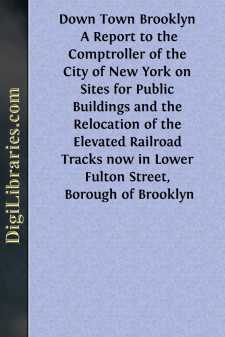Categories
- Antiques & Collectibles 13
- Architecture 36
- Art 48
- Bibles 22
- Biography & Autobiography 813
- Body, Mind & Spirit 142
- Business & Economics 28
- Children's Books 16
- Children's Fiction 13
- Computers 4
- Cooking 94
- Crafts & Hobbies 4
- Drama 346
- Education 46
- Family & Relationships 57
- Fiction 11829
- Games 19
- Gardening 17
- Health & Fitness 34
- History 1377
- House & Home 1
- Humor 147
- Juvenile Fiction 1873
- Juvenile Nonfiction 202
- Language Arts & Disciplines 88
- Law 16
- Literary Collections 686
- Literary Criticism 179
- Mathematics 13
- Medical 41
- Music 40
- Nature 179
- Non-Classifiable 1768
- Performing Arts 7
- Periodicals 1453
- Philosophy 64
- Photography 2
- Poetry 896
- Political Science 203
- Psychology 42
- Reference 154
- Religion 513
- Science 126
- Self-Help 84
- Social Science 81
- Sports & Recreation 34
- Study Aids 3
- Technology & Engineering 59
- Transportation 23
- Travel 463
- True Crime 29
Charles Duran Or, The Career of a Bad Boy By the author of "The Waldos"
by: Unknown
Categories:
Description:
Excerpt
CHAPTER I.
Before giving the history of Charles Duran's birth, life, and early death, I will partially describe his father's residence. It was situated in the town of ——, in the State of Connecticut, and about six miles from the west bank of the beautiful Connecticut river. The house stood on a level road, running north and south, and was about one mile from the centre of the town.
Mr. Duran's house was large and commodious. It was built of wood, two stories high, and painted a deep yellow. In the front was a fine court-yard. In this yard were lilacs of a large growth, roses of various kinds, and flowering almonds. These shrubs blossomed early in the spring, and sent forth their fragrance to perfume the air.
On the south was a rich and well-cultivated garden, producing an abundance of vegetables, gooseberries, currants, and raspberries. The borders of the main alley were decked with pionies, pinks, and sweet-williams.
Between the garden and the house was the well. A long sweep, resting on the top of a high post, with a pole fastened to the upper end, was the rude contrivance for drawing water. To the lower end of the pole was attached a bucket. How many of New-England's sons remember with delight the "old oaken bucket that hung in the well!"
On the north side of the house was a small orchard. In the rear were the barn, sheds, crib, and other out-buildings.
The grounds in the immediate neighborhood were level or slightly undulated. On the north and east were beautiful meadows. On the south and west were excellent tillage and pasture lands. The season that I spent there was one of nature's bountifulness. The tall herd's-grass, the rustling corn, and the whitened grain waved in the summer's breeze, and bespoke the plenty that followed the toil and industry of the husbandman. The herds were feeding in the fields. The innocent lambs, free from care, were leaping and frisking about—some in the sun and some in the shade—while their more sober dames were either grazing, or quietly masticating the food they had previously collected.
Half encircling these premises was a fine stream of water, varying from three to seven yards in width. It was supplied with dace, trout, roach, and perch. Its plaintive, monotonous murmur sometimes impressed the mind with sadness. This was soon dispelled, however, by the twittering, the glee, and the sweet notes of the birds, that hopped from spray to spray, or quietly perched themselves on the overhanging branches.
Some little distance to the northwest of Mr. Duran's house was a forest of thrifty growth, covered with a varied and beautiful foliage. Its shady bowers and pleasant walks made it a delightful place of resort,—especially toward the time of sunsetting. Nature seemed to lend to it then peculiar charms.
In the centre of the town stood the old church, antiquated in its appearance, but venerable and holy in its associations. In that old-fashioned church have been settled three successive ministers of the gospel. In those high-backed, square pews were other generations wont to sit. Those pastors and their flocks now sleep in the grave. Their sons occupy their places in the sanctuary, and another herald of the cross proclaims to them the word of life. It was in this pleasant place, which I have briefly described, that Charles Duran was born.
CHAPTER II.
The birth of Charles was an occasion of great joy in Mr. Duran's family. Blessings long withheld are frequently more highly prized when at length received. Mr. Duran had no children, and was now past the meridian of life. To him this child seemed like one born out of due time.
It was amusing to see the effect produced on the parents by this, till recently, unexpected event. "Well, Molly," said Mr. Jones,—a neighbor of Mr. Duran, whose wife had just been to see the strange visitant, and who had reared a large family of children,—"how do Mr. and Mrs. Duran act with the boy?" "Act? why just like two grown-up children. And they think it is the most wonderful child that ever was born. But they don't know what it may live to be!"
These last words were spoken in a tone of voice which told of hidden springs of sorrow. One of Mrs. Jones' own dear children, a promising, lovely boy, had early become intemperate, and was now sleeping in a drunkard's grave!
Having passed through the ordinary nursery incidents of the first months of infancy, Charley—for so he was familiarly called—became a fine fat child. "Sweet boy," said his mother, as she rather clumsily patted his cheeks, and felt of his tender limbs, "you will be a comfort to your parents in their old age."
"I was just thinking of that," added the father. "What a blessing he will be to us! He will manage the farm—administer to our comfort, and inherit our estate."
Many a bright sunny morning has been followed by a dark cloudy evening. Our supposed blessings often prove to us a source of disappointment and sorrow. I have seen the mother clasp her lovely infant to her breast, and fondly and dotingly caress it, and press its little hands and feet, soft as velvet, with her lips. And I have seen that child, the rainbow of promise, and the cause of so much joy, bring down that mother's head, ere it was gray, with sorrow to the grave.
Thoughts like these, however, never crossed the minds of Mr. and Mrs. Duran. They dreamed not that sickness and death might blast their hopes, and leave them more lonely than they were before. So staid and uniform had been their own life, that they never once supposed that Charles, if he should grow up, could pursue any other course.
Every day little Charles became more and more the object of cherished hopes and affections. The hearts of the parents were bound up in him. He became their idol. His wants, real and imaginary, were all met. His danger was of being spoiled by too much indulgence.
"I believe they will kill him with kindness," was the remark of Ann, a colored woman, who had long lived in the family. "It is just the way Mr. Parsons used to do with his Jim, who never amounted to anything."
CHAPTER III.
"Train up a child in the way he should go; and when he is old he will not depart from it." Prov. xxii, 6. The proper training of children is of the utmost importance. Upon it to a great extent depend their usefulness and happiness in the world....




![The Golden Mean or Ratio[(1+sqrt(5))/2]](https://digilibraries-com.s3.eu-central-1.amazonaws.com/covers/762d190f-63a4-489a-b897-ff78516bd105.jpg)







